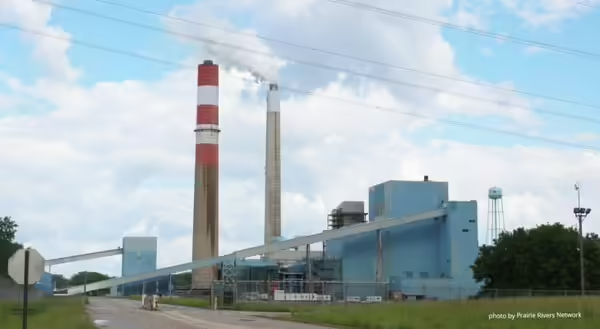
In the fall of 2019, the communities of Canton and Havana were hit with the shocking news that Vistra Corp. planned closing the local coal-fired power plants within three months. Community leaders were left to navigate the detrimental impacts to their tax base and workforce and they turned to each other to share ideas and resources.
This scenario is happening throughout Illinois. In the central Illinois region, Hennepin, Ill. and Coffeen, Ill. are experiencing similar challenges as Canton and Havana. Since 2011, Illinois has experienced closures of over half of its coal plants.
Community leaders in Canton, Havana, Hennepin, and Coffeen turned to each other to share ideas and resources that could help them deal with the situation. University of Illinois Extension Community and Economic Development Educator Kathie Brown got involved to help the group navigate conversations and build their network of resources.
“Several organizations were also working with communities in different capacities and this past summer we were able to streamline those conversations by bringing together several organizations and community leaders for a more formal virtual convening,” noted Brown. “Greater Peoria Economic Development Council, Just Transition Fund, and Prairie Rivers Network joined leaders from Fulton and Mason counties, as well as local government representatives from Coffeen, Edwards, Hennepin, Carbondale and Meredosia coal-fired power plants.
“Our goal quite simply was to create a platform to discuss shared needs, challenges, and opportunities. Communities would learn from one another, and possibly create shared solutions to deal with this enormous challenge,” said Brown.
More than 25 people participated in the first virtual conversation held October 15, 2020. The group included community leaders, state representatives, and local agencies. The guided discussion focused on Workforce, Economic Development and Environmental concerns. State legislators and representatives from the IL Department of Commerce and Economic Opportunity, IL Environmental Protection Agency, the Workforce Investment Board and the US Economic Development Administration all participated in the conversations.
“The feedback we received indicated all were in agreement that the exchange of information was valuable,” Brown commented.
A second virtual conversation was held December 7 to discuss the issue of property assessment for closed coal plant facilities and the economic devastation created by reduced tax revenue to local government and services. Representatives from Jackson County also joined this call to provide an overview of considerations made in property tax assessment at the Grand Tower Plant.
“Our goals continue to be focused on sharing information among communities to support transition planning to mitigate the economic impacts of plant closures,” Brown explained. “Future discussions are likely to center around understanding current policy considerations, environmental concerns, and strategies for economic recovery.”
Empowering communities to move forward by providing support needed to drive successful economic transitions is critical for our rural economy.
ABOUT THE AUTHOR
Kathie Brown, University of Illinois Extension Community and Economic Development educator {retired June 2021} As a community and economic development educator, Kathie Brown works with community leaders, government officials, volunteer groups, small business owners, and others to help communities become stronger and more economically viable. She focuses on leadership and organizational development; local government education and relations; economic development strategies; participatory community planning/visioning processes; group process facilitation; collaboration and partnership building; public issue education; and understanding, using, and developing data.
Brown works with organizations and local governments to help them: (1) analyze and understand their needs, (2) identify alternative courses of action, (3) make informed decisions, (4) plan for the future, and (5) evaluate their development efforts.
Kathie has worked for Extension for almost 40 years, contributing to programs related to community health, digital literacy, STEAM education, and more.
This position focuses on the core skill areas of strategic planning, community leadership skills, data for decision making, needs assessment, and collaboration. Programmatic areas are leadership development, education for economic development, public policy education, and data/information and referral services.
ABOUT EXTENSION SNAPSHOTS
Extension Snapshots are monthly impact reports that share the stories of our programs in Fulton, Mason, Peoria, and Tazewell counties. To have them delivered to you directly sign up using our E-blast registration.